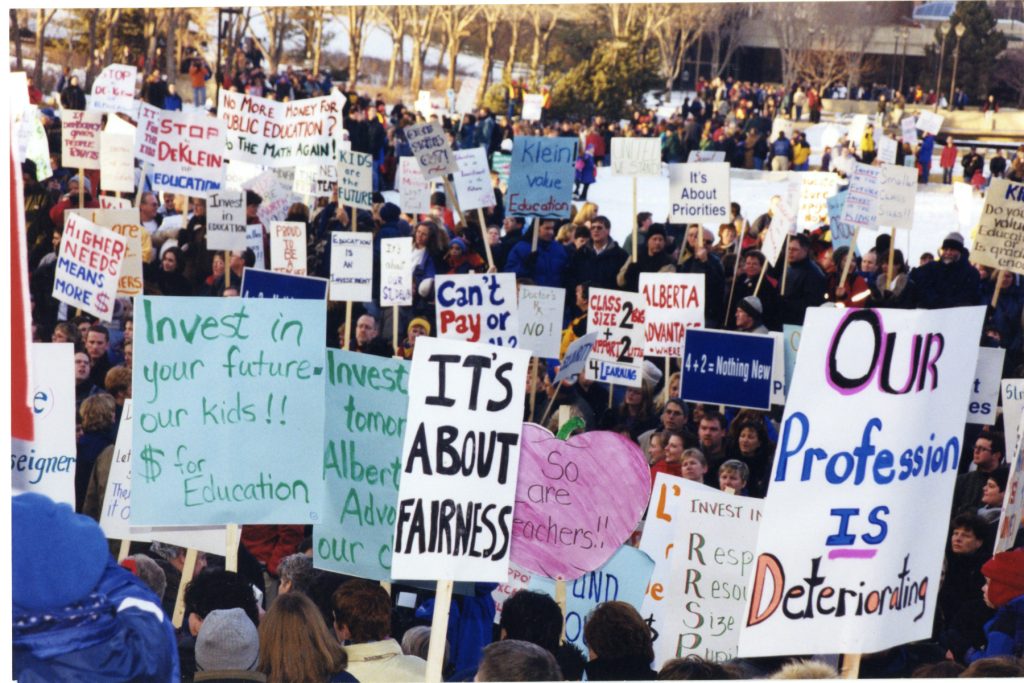Alberta stands on the threshold of one of its most consequential education battles in decades.
After the Alberta Teachers’ Association (ATA) tallied votes between Sept. 27 and 29, a total of 38,113 ballots rejected the province’s latest tentative agreement, while 4,479 voted in favour — an overwhelming 89.5 per cent “no” vote (with 770 abstentions) out of 43,362 total ballots cast. The resounding rejection signalled that unless a new agreement was reached and ratified, a provincewide strike would occur starting at 12:01 a.m. on Oct. 6.
The proposal included a 12 per cent wage increase over four years and promises to hire 3,000 additional teachers, with the intention to ease pressure on class size and workloads. Jason Schilling, president of the ATA, has responded to this offer, saying “teachers cannot accept a salary offer that does not attract and retain Alberta teachers by catching up and keeping up with inflation.” He highlights that over the last decade teachers have received a mere 5.75 per cent increase in pay. According to Statistics Canada, since 2015, Alberta has had an average inflation rate of 2.49 per cent every year, accumulating to an increase of 27.84 per cent by August 2025.
The issues go beyond pay. Schilling emphasizes that the proposal failed to address deeper, systemic frustrations, including overcrowded classes, escalating student complexity and a chronic lack of on-the-ground support. Many teachers have concurred that the deal ignored what they view as the heart of the problem.
Throughout the past weeks, both sides have leaned into public messaging and political theatre. The government under Premier Danielle Smith emphasized the offer as generous and fiscally responsible. Teachers, through the ATA, criticized it as insufficient — symbolic rather than transformative. On Oct. 3, as the strike deadline loomed, “exploratory conversations” resumed between the two sides, yet no tentative agreements emerged.
As reported by Global News, school boards across the province began preparing for disruption. In Calgary, Edmonton, Lethbridge and elsewhere, boards alerted families that in the absence of a last-minute deal, in-person instruction, online classes, extracurriculars and field trips will be suspended effective Oct. 6. Some divisions turned off access to in-school platforms (e.g. learning management systems) during the strike, due to concerns around supervision, privacy and security. Parents are scrambling for alternative arrangements such as tutors, daycare and homeschooling. Many are sympathetic to teachers but worried about sustaining daily routines without institutional support.
While striking teachers risk lost wages and public criticism, the stakes are high on the government side too. A protracted stoppage could lead to serious learning loss, increased childcare burdens, political blowback and pressure to invoke back-to-work legislation. The government may feel compelled to act as school closures deepen and public anxiety mounts. For Premier Smith, this is both a test of educational policy and political judgement. Should the strike drag on, even neutral observers may ask whether Alberta is willing to invest in teaching beyond bargaining chips.
At its core, this confrontation is about more than salaries. It’s a battle over how Alberta values public education, especially amid population growth, changing student needs and evolving expectations of teacher workloads. With the ongoing strike, Alberta enters a tense new chapter in its public-sector history, one that could reshape education for years.
For Ontarians and Canadians, this story serves as a political mirror. Alberta often acts as an ideological test case for the rest of Canada — Premier Danielle Smith’s government leans heavily on fiscal restraint and privatization narratives that echo in other provincial governments, including Ontario’s.
If Alberta’s standoff escalates or leads to legislative intervention (like back-to-work laws), it could influence Ontario’s own education negotiations or public-sector strategies. Parents and teachers here are already familiar with similar disputes under Doug Ford’s government. Alberta’s outcome may set an informal precedent or talking points for future bargaining cycles.

